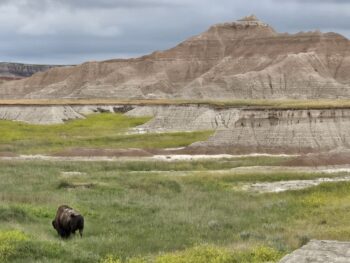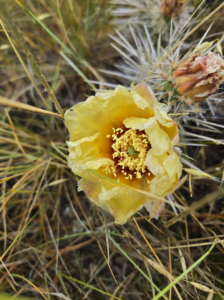 By Nicholas Tangen
By Nicholas Tangen
Last week, I spent three days hiking the Sage Creek Wilderness Area in Badlands National Park, a sharp, winding, and otherworldly landscape. We hiked a trailless loop through the backcountry, over tall geological formations, through knee-high prairie grass, and into concentrated stands of juniper trees.
The sky in the badlands was immense and the presence of bison, pronghorns, and coyote choirs transported us into a long-ago age for a few days. Everywhere we walked, cacti clung to the edges of crags and ledges, collecting water as they could from the harsh ground of the Badlands spires.
“The harshness and the scarcity of even water in the desert put these early monks and hermits into a posture of utter dependence on God.”
In the evenings, as we recovered from hiking the tough terrain, I laid in my tent and read a short collection of the Conferences and Institutes of John Cassian, a Fourth-Century monk and theologian, who chronicled the wisdom and experience of early monastics in the Egyptian desert. I’ve been fascinated with monastic Christianity for years, and the chance to reflect on the Desert Fathers and Mothers in a setting like the Badlands – very much like a desert – was a gift for those days in the backcountry.
WHAT IS IT about the harshness of a desert, the sharp rocks, the dry ground, and the overwhelming silence that has drawn faithful Christians from the beginning? In part, it’s the chance to follow the example of Jesus who traversed the wilderness, the desert, for 40 days following his baptism. But John Cassian also points to another motivation in Conferences XVIII:
Finding then that [hermits] were living near the river Nile in a place which is surrounded on one side by the same river … habitable by none but monks seeking such recesses, since the saltness of the soil and dryness of the sand make it unfit for any cultivation – to these [hermits], I say, we eagerly hastened, and were beyond measure astonished at their labours which they endure in the contemplation of the virtues and their love of solitude. For they are hampered by such a scarcity even of water that the care and exactness with which they portion it out is such as no miser would bestow in preserving and hoarding the most precious kind of wine.
The harshness and the scarcity of even water in the desert put these early monks and hermits into a posture of utter dependence on God and thanksgiving for the small immensity of the mere essentials for life. The stripping away of anything unessential, anything comfortable, anything distracting allowed for these followers of Jesus to contemplate the richness of God’s mercy and the gift of life itself. And it bred resilience and discipline in their daily lives. 
“The chance to reflect on the Desert Fathers and Mothers in a setting like the Badlands – very much like a desert – was a gift for those days in the backcountry.”
While inspired by the intensity of the lives of these desert mothers and fathers, I don’t think I’ll be retreating to a cave in the Badlands anytime soon. But their lives and the sharp rocks of the Badlands did have me wondering about the distractions and comforts that often cloud my awareness of God’s mercy and activity in my own daily life, those things that hijack my attention and draw me away from my neighbor.
They helped me as well to think about those neighbors who live lives of harshness and inhospitality in our very midst, who do not have the privilege to retreat to the desert as a spiritual exercise, because they live it every day. And they challenged me to hold fast to the knowledge of God’s love and accompaniment when blessings seem dried up, when the challenges of community contribute to isolation, and when the possibilities for new life appear unlikely. Because, just like the little cactus I encountered in the Badlands, all along the crags and the ledges of the deserts in our own lives, God makes a way and the presence of these small miracles is beautiful to behold.

